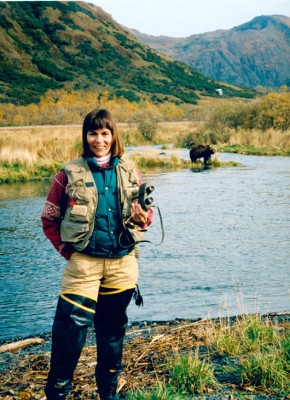By Bob Ferris
"A thing is right when it tends to
preserve the integrity, stability and beauty of the biotic community. It
is wrong when it tends otherwise." Aldo Leopold A Sand County Almanac,
1948
I have been spending a lot of
time lately reading scientific justifications and policy statements
emanating out of the US Fish and Wildlife Service such as the new policy
on “significant portion of its range” (see Society for Conservation Biology Comments) for the Endangered Species Act (ESA) and the leaked documents on the wolverine ESA listing tangle. This is a painful process because these documents and other related works are often so tortured and mind-numbing.
Well worded and grammatically correct these pieces are so covered
with political fingerprints, cripplingly bent by special interest
hip-checks and too liberally doused with an absence of courage that you
have to keep going back to the title page to remind yourself that these
were written and issued by an agency with public trust responsibilities
(i.e., the folks who are supposed to protect our natural resources for
future generations, including making sure that species do not blink out
and that ecosystems still function naturally and not like grand, but
woefully inadequate, zoo enclosures.)
Being older I have the opportunity in all this for hindsight and
vision. And what we are seeing in these type-rich decrees is not
reflective of the former and shows little or none of the latter. They
are, in short, the ministrations of bureaucrats told to fit a square and
wondrous peg into a hole of a disastrously diminishing diameter and
taking pride in the process.
Being older I also remember the peril we were experiencing in the
1960s and the promise expressed in our cornerstone environmental
laws—The National Environmental Policy Act, the Endangered Species Act,
the Clean Water Act and the Clean Air Act as well as the cavalcade of
initials that followed. These were supposed to take us from peril to
promise and beyond. They were meant to stop the rivers from burning,
help us breathe, bring back declining and disappearing species and
basically stop Iron Eyes Cody (above) from crying. And they made
progress for a while. But older folks forgot that diligence is always
required and younger people never knew what was lost or what could be
recovered.
Before I charge off in some too obscure reminiscences, let me
return to the Aldo Leopold quote at the top of this piece. Because when
you carve away all of the extraneous parts of any of these documents
and melt them down in the crucible of intent they should always have as
their immutable backbone the sentiments espoused above by Dr. Leopold.
Always.
If they do not, we should not accept them. If they do not, we
should challenge them until they do. If the leaders of this agency and
others are not insisting that under their watch more is going to be
protected and recovered in their quest to do what is right then why
would we accept them as leaders? Any fool can continue to accept
species declines, dilute the intent of the ESA, embrace inaction, and
make things worse, but we should really expect more from our leaders.
Now the US FWS will claim there are reasons for not taking the
above position and ignoring or significantly softening Dr. Leopold’s
dictum. Congress will cut our funding. The ranchers and timber
interests will not like us. The Koch
brothers will finance another anti-wolf video. But these are not
reasons, they are excuses. The bad news is that while excuses give us
comfort and shelter, experience tells us that waiting or avoidance only
makes the eventual consequences worse.
 Perhaps in reference to the above, the US FWS should consult with
their sister Interior agency the Bureau of Land Management and ask them
if they could go back in time and remove Cliven Bundy’s cattle in the
early 1990s whether that would have brought a better result than our
current situation. Certainly rolling over and peeing on oneself saves
you a little immediate grief, but in the long term it just earns you
more bullying and beatings—both literal and figurative.
Perhaps in reference to the above, the US FWS should consult with
their sister Interior agency the Bureau of Land Management and ask them
if they could go back in time and remove Cliven Bundy’s cattle in the
early 1990s whether that would have brought a better result than our
current situation. Certainly rolling over and peeing on oneself saves
you a little immediate grief, but in the long term it just earns you
more bullying and beatings—both literal and figurative.
Am I asking for the impossible here, that a director of the US FWS
would embrace the above quote and try to brave the “slings and arrows”
shot by Congress and industry? No. When I first worked in DC I spent
time with John Turner, Mollie Beattie and Sam Hamilton—all former
directors of the US Fish and Wildlife Service and all folks who stood up
for species even when it was less than comfortable.
John Turner
“John Turner, U.S. Fish and Wildlife
Service director under the previous Bush administration, said in a
telephone interview, he and others developed the program that Babbitt
carried out to reintroduce wolves and allow killing of problem animals.
Other Republicans, going back to William
Penn Mott, National Park Service director under Reagan also pushed for
wolf reintroduction.
"This is a bipartisan issue," said Turner, a friend of President-elect Bush and president of The Conservation Fund.” In Official urges West to find space for wolves:
Babbitt confident animals will thrive by Rocky Barker
Babbitt confident animals will thrive by Rocky Barker
I met John Turner
roughly 20 years ago when we sat together on a wolf panel at a National
Cattlemen and Beef Association forum in Washington, DC—the two of us in
suits surrounded by a sea of cowboy hats. While it was logical that I
was there because I had recently taken over the wolf programs at
Defenders of Wildlife and was administering the organization’s
compensation program, Mr. Turner’s presence was a little less logical.
You see, John was a Republican who had just left the director’s
position at the US FWS to take the leadership slot at The Conservation
Fund and he was also a multi-generational Wyoming rancher
and outfitter complete with a missing finger joint from a roping
accident. Yet he was voluntarily there talking with ranchers (his
peers) about the need to protect and recover wolves.
"Economic incentives are the bridge between what we are doing now and what we should be doing for endangered species," said Bob Ferris of Defenders of Wildlife.
As we are both biologists, our messages were largely similar in
that we each argued that the wolf had a place in the West. Our messages
were also similar in that we were simultaneously looking at traditional
and creative ways to minimize friction. I was new to this arena and
John helped me through some of the tougher questions on administrative
details and history where I had some gaps. We later collaborated on our
shared interest in creating economic incentives for endangered species
conservation on private lands.
Mollie Beattie
“In the long term, the economy and the
environment are the same thing. If it's unenvironmental it is
uneconomical. That is the rule of nature.” Mollie Beattie in Woman of the Woods: Mollie Beattie, a Natural as Fish and Wildlife Chief by Ted Gup
My interactions with Mollie were too few and mainly were more
conversations than working together in any traditional sense. We sat
next to each other at a few events and talked about wolves, but I will
say that she simultaneously
exuded serenity and a principled nature. More importantly she was
courageous—not only through her illness—but when dealing with Congress.
"What a country chooses to save is what a
country chooses to say about itself.” — Mollie Beattie, former Director
of the US Fish and Wildlife Service (1947-1996)
 My strongest memory of Mollie was during some hearings in the newly
re-named Resources Committee in the House (nee Natural Resources)
chaired by Don Young of Alaska.
All during the hearing Congressman Young (R-AK) who referred to his
female colleagues Barbara Cubin (R-WY) and Helen Chenoweth (R-ID) as his
“sled dogs” waved a walrus baculum (i.e., penis bone) at the then
Director of the US Fish and Wildlife Service. But Mollie held her
ground, defended the Endangered Species Act and stood up to those in
Congress attacking this and other bedrock environmental laws.
My strongest memory of Mollie was during some hearings in the newly
re-named Resources Committee in the House (nee Natural Resources)
chaired by Don Young of Alaska.
All during the hearing Congressman Young (R-AK) who referred to his
female colleagues Barbara Cubin (R-WY) and Helen Chenoweth (R-ID) as his
“sled dogs” waved a walrus baculum (i.e., penis bone) at the then
Director of the US Fish and Wildlife Service. But Mollie held her
ground, defended the Endangered Species Act and stood up to those in
Congress attacking this and other bedrock environmental laws.
“So Mollie calmly informed Congressman
Young that the ESA was basically a good law, and that she intended to
uphold and improve it. Did the Chair have any constructive suggestions?”
Vermon Law School Lawyer and Faculty member Patrick Parenteau in She Runs With Wolves: In Memory of Mollie Beattie
Sam Hamilton
Of the three I probably spent the most time with Sam Hamilton (at
left at left) who also had the shortest tenure of the three as
Secretary succumbing to a fatal heart attack while skiing in the Rocky
Mountains mere months after his confirmation.
I met Sam initially through the Black Bear Conservation Coalition
that met each year in Louisiana. Our meetings about black bear
conservation when he worked for the US FWS out of the Atlanta office
eventually led to other discussions at professional meetings like North
American’s and those of the Wildlife Society.
It was at The Wildlife Society meeting one year when I ran into a
bob white quail and turkey biologist from the Southwest who talked to me
about issues of game bird recruitment and expanding coyote populations.
The biologist and I brought Sam into the equation when we started
discussing red wolves as a possible solution in Mississippi. As a
result, Sam helped us set up a meeting in Yazoo City, Mississippi with
local landowners and decision-makers. We picked this site because of
this area’s proximity to large tracts of public lands (i.e., Delta
National Forest, Panther Swamp Wildlife Refuge and the Theodore
Roosevelt National Wildlife Refuge), the low human density and the
absence of a significant livestock population. Sam worked hard on this
and we got very, very close to pulling it off. He saw the opportunity
here as he did in the Everglades to do something remarkable for
willdlife in the true spirit of cooperative conservation. Who knows
what Sam would have accomplished if he had lived (or Mollie for that
matter), but if his past was a mirror of his future we expected great
things.
******
These are three people from three very different parts of the
country and with different experiences and political persuasions. Yet
all three of them took their jobs at the USFWS seriously and while there
supported the Endangered Species Act—including taking affirmative and
courageous actions for wolves. Perhaps the current leadership—many of
whom were present during the tenures of these three—will use this and
them as an empowering touchstone for their own leadership. Maybe then
they will remember that their jobs should be looking for ever-increasing
ways to save species rather than looking for ways to avoid taking steps
needed to “preserve the integrity, stability and beauty of the biotic
community” under their stewardship.
Send a message to Director Dan Ashe by clicking this button:



No comments:
Post a Comment